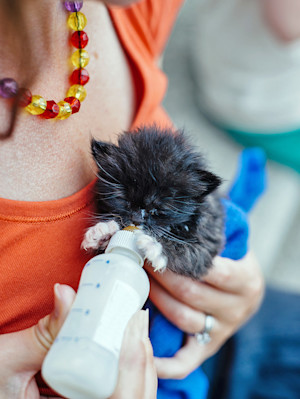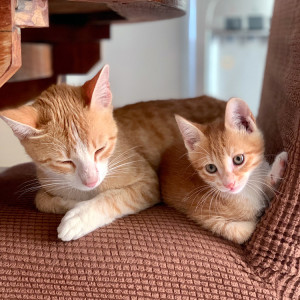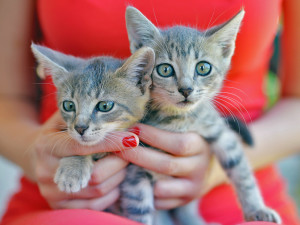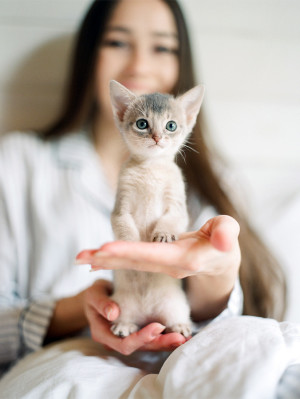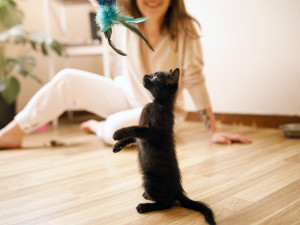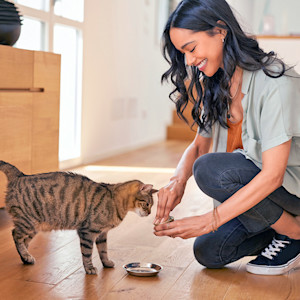How to Help a Kitten Gain Weight
Of course, always talk to your vet first.
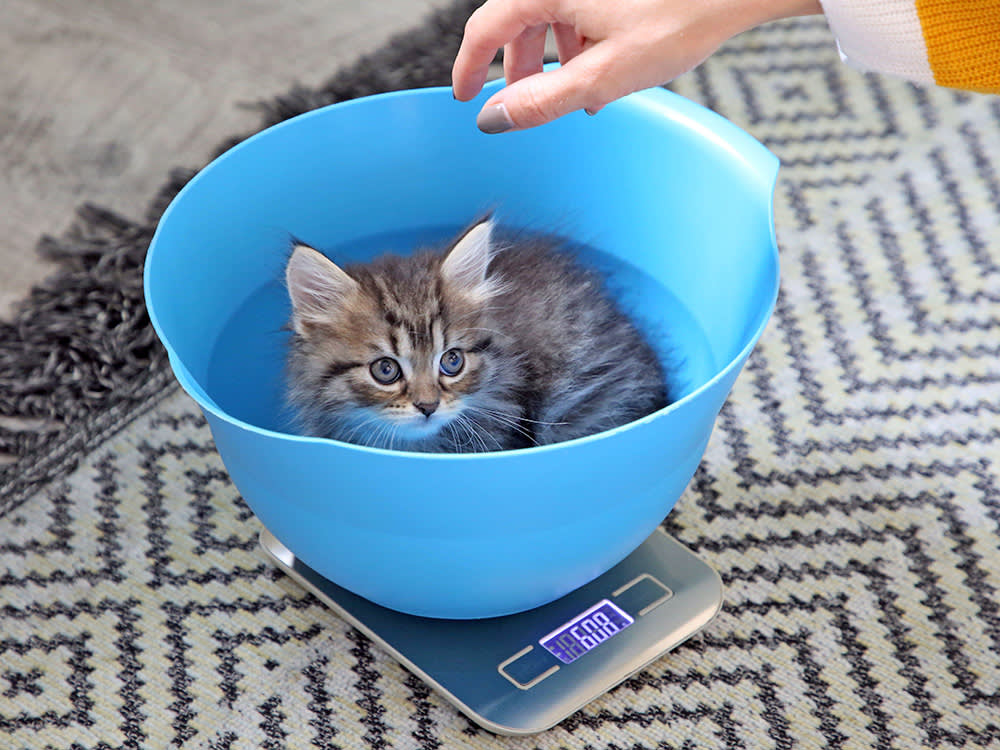
Share Article
In This Article:
How to Help a Kitten Gain Weight Why Is My Kitten Underweight? Nutritional Strategies for Weight Gain Underweight Kitten: Risks and Solutions
Helping a kitten gain weight requires a careful balance of proper nutrition, feeding frequency, and monitoring for underlying health issues. For healthy kittens, it really shouldn’t take much effort once you get into a groove with your feeding routine. By understanding your kitten’s specific needs, you can support healthy weight gain and ensure your furry friend grows into a strong, healthy cat.
Helping a kitten gain weight should be as simple as feeding them an appropriate diet and offering adequate amounts of food at regular intervals. If you are doing those things and feel like your kitten is still too thin or does not seem to be gaining weight consistently, it’s important to see your vet.
If you want to be sure your kitten is growing as expected, there are some easy guidelines to track their weight and growth too. Read on to learn more.

Why is my kitten underweight?
If you are concerned that your kitten is underweight, it is important to determine if they are truly too thin or if they are at a normal size for their age. If you haven’t been around lots of kittens, you may find their long, lanky bodies appear too thin, especially compared to adult cats who are often more muscular, rounder, or even loaf-like. A great guideline to keep in mind is that kittens typically gain one pound per month for the first three months of life. Therefore, a two month old kitten should weigh around two pounds, while a three-month old kitten should weigh at least three pounds.
If your kitten falls into these guidelines, they are right on track, and they are probably at a healthy weight. If your kitten is well under weight given their age, or if you have a kitten who is older and seems underweight, it is important to see a vet for a thorough exam and evaluation. There are many reasons a kitten could be underweight. Some of the most common causes include:
Intestinal parasites: Worms are very common in kittens; they can acquire them from their mothers. Intestinal parasites absorb nutrients directly from the digestive tract, essentially bogarting them from your kitten and causing malnutrition, despite your kitten eating plenty of food. Some kittens may have other signs when they have intestinal parasites including diarrhea, gas, or they may even vomit up a worm. Other times, there are no obvious signs aside from poor growth and slow weight gain. Your vet can easily test for the common intestinal parasites and treat your kitten with a safe deworming protocol.
Inadequate diet: kittens grow very rapidly and require a high-calorie, nutrient-dense diet in order to meet these demands. They should be fed a diet that is specifically formulated for kittens or is labeled to meet the needs of all life stages. If your kitten is eating adult or senior cat food, a homemade diet, or anything other than kitten food, they may not be getting enough of the nutrients they need for proper growth and weight gain.
Because kittens have small stomachs, they need to be able to get a lot of calories and nutrients in a small quantity of food. This is why kitten formulas are made to provide everything they need in a small volume. Kittens simply cannot eat enough of an adult cat food to get all of their needs met because they get full before they can eat a large enough portion. It is also important to keep in mind that because their stomachs are so small, they need to eat more frequently to keep up with their needs. While adult cats can tolerate fewer feedings per day, kittens may need at least three or four small meals a day depending on their age and weight.Stress: If you have a new kitten in your home and they are still getting adjusted to their new digs, their appetite may be affected. Sometimes, kittens will hide when they are scared, especially if there are other pets in the home that are a little too friendly or curious. They may also need time to adjust to the routine of when meals are served and where. Be sure to separate your new kitten for the first few weeks, especially during meal times. Give them a quiet, safe space to eat on their own without competition from other pets and without distractions of noises, smells, and new experiences.
Medical conditions: If you’ve ruled out all the quick fixes and you are still concerned that your kitten is not gaining weight properly, your vet may need to dig deeper into possible medical causes. There are a number of medical conditions that could cause your kitten to be slow to grow and/or gain weight including congenital problems like a liver shunt, growth hormone deficiency, or hypothyroidism. Your veterinarian can discuss other signs that may be consistent with these conditions and how to test for them.
Nutritional strategies for weight gain
For most kittens, weight gain will be consistent and predictable as long as their diet and routine are appropriate for their age. While it is important to ensure your kitten is steadily gaining weight, a healthy kitten won’t need any intensive strategies to stay on their growth curve.
Even a kitten who starts out scrawny will usually catch up quickly once they are given a proper diet and routine healthcare. For those kittens who have had all of these benefits and still don’t seem to be gaining weight, it’s very important to see a vet as soon as possible to get to the bottom of the problem. That said, if you are just starting out and need to get your kitten into a healthy routine, here are some ways to ensure proper weight gain:
Kitten food diets for weight gain
This is by far the most important step you can take to help a growing kitten gain weight properly. Make sure they are eating a diet that is specifically labeled for kittens or all life stages. Adult cat food is not sufficient for a growing kitten and can slow their growth and weight gain.
Increasing meal frequency
Small frequent meals are the best way to feed a growing kitten. Depending on their age and size, your vet may recommend anywhere from three to four feedings per day, or more for very young kittens. Small frequent feedings allow your kitten to eat more without leading to bloating and digestive upset from eating too much in one sitting. If you have to leave your kitten alone for longer periods of time, try using an automated feeder to supply them with more frequent small meals throughout the day instead of just leaving out a big bowl of food.
Cat weight gain supplements
These are really unnecessary and should be avoided. You don’t want your kitten filling up on snacks, treats, or supplements that are not complete and balanced with all of the nutrients they need. If your cat eats a lot of these foods, they may not eat enough of their cat food diet, which can lead to nutritional deficiencies and actually slow their growth and weight gain in the long run. If you have tried all the other strategies and feel that your kitten is still not gaining weight or growing as they should, it is definitely time to see your vet.
Underweight kitten: risks and solutions
If you are concerned that your kitten is underweight, there are many scenarios to consider, including:
Kitten not gaining weight despite eating
If your kitten is already eating a high quality kitten food, has plenty of small meals throughout the day, and has a good appetite yet does not seem to be gaining any weight, there may be an underlying health issue affecting their growth. This could be as simple as intestinal parasites, which are common and easy to treat. It could also be a sign of a more complex problem. It is important to see your vet in this case to start tracking your kitten’s growth and weight and to do some initial diagnostic tests to look for likely medical problems.
Behavioral challenges
Sometimes kittens are not eating enough due to a behavioral problem. This is most common when a kitten is newly adopted and still adjusting to their new home. The stress of the new environment may lead them to hide and avoid eating. They may also be afraid of other pets or people in the home, or be reluctant to explore the house and seek out their food.
Sometimes, if there are multiple kittens or other pets in the home, they may outcompete a smaller or younger kitten for food and prevent the kitten from getting enough to eat. All of these are good reasons to give your kitten a quiet, private, stress — free place to eat. This may include separating your kitten from all the other pets and putting them in a room that is quiet and secluded from the hustle and bustle of the household. Other techniques to reduce stress include providing a safe hiding place for your kitten and using calming pheromone scents to create a cozy vibe.
Balancing activity with calorie intake
You may notice that your kitten is very active, as in superhero-levels of activity and acrobatics all day long. And while you may be wondering if all this activity is the cause of your kitten’s slow weight gain, the truth is that for healthy kittens who are eating a proper diet, they should be able to meet their needs despite their gravity-defying zoomie episodes.
There is no need, and really no way, to limit their activity, nor should you. If you are following the feeding guidelines for the type of food your kitten is eating based on their age, that should be plenty of calories to sustain their gold medal aspirations.
When to consult a veterinarian
If you have a young kitten, you should be seeing your vet at regular intervals to keep up with their early preventative health care, including vaccine appointments, dewormings, and scheduling their spay or neuter. All of these appointments are also opportunities to check in on your kitten’s weight and have your vet evaluate your kitten’s growth and overall health. They may pick up on subtle changes in your kitten’s weight or notice signs of illness or slow growth during these visits. If not, and you feel your kitten is not gaining weight according to the general guidelines for their age, or if you are noticing any other signs of illness, it is important to see your vet right away.
Good habits
Young kittens seem like bottomless pits in that they can eat and eat and eat and continue to be thin and active. However, it is important to remember that kittenhood is relatively short and by one year old, most cats will reach their adult size. For this reason, it is important to set up good habits early on as far as feeding your cat at scheduled times of day and with measured portions instead of giving them access to unlimited food all day long.
While this free-feeding approach may work ok for a growing kitten in some cases, adult cats are much more likely to overeat and gain weight since they are no longer growing. We know that obesity is a common problem for indoor cats since they often overeat and tend to be inactive. By setting up good habits for your kitten, you can get them into a routine that will also work in adulthood. Be sure to make play sessions and enrichment part of their daily routine as well to keep them physically and mentally fit, too.
References:
Merck Manual: Congenital and Inherited Disorders of the Digestive System in Catsopens in new tab
Merck Manual: Disorders of the Thyroid Gland in Catsopens in new tab
Veterinary Partner: What First Time Kitten Owners Should Knowopens in new tab

Dr. Amy Fox, DVM
Amy Fox, DVM is a small animal veterinarian in New York City with over thirteen years of experience in a mixture of general practice, emergency medicine, and shelter medicine. A lifelong animal lover, Dr. Fox studied biology in college and then worked as a veterinary nurse before pursuing veterinary school at Cornell University. Her expertise includes surgery, dentistry, and management of chronic conditions, and she is interested in toxicology, pain management, nutrition, care of senior pets, and educational outreach. Dr. Fox also enjoys writing about veterinary medicine and teaching, and her work has previously appeared in Spruce Pets. In her free time, she loves to cook, garden, go for long runs, and hang out with her goofy mixed-breed dog May, who provides never ending comic relief!
Related articles
Kitten Teething: Do Kittens Lose Their Teeth?
Get those little chompers ready for the kitten tooth fairy.
![Young woman showing gray kitten.]()
5 Development Stages You Should Know When You Get a Kitten
What to expect from birth to 16 months.
![Woman playing with a black kitten.]()
5 Kitten Behavioral Milestones You Should Know
Keep track of all their fun phases with these guidelines.
![Woman feeding her kitten.]()
When Can a Kitten Eat Wet Food?
And how to know what kind they need.
What Can I Feed a Kitten?
Learn what nutrients are a must for your new little one.

